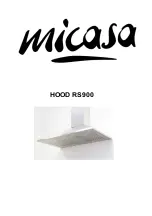
14
O
VEN
C
OOKING
Drying Notes:
• To purchase a drying rack, contact your Jenn-Air dealer for
the “DRYINGRACK” Accessory Kit or call 1-800-JENNAIR.
• Most fruits and vegetables dry well and retain their color
when dried at 140
°
F. Meat and jerky should be dried at 145
°
-
150
°
F. For optimal flavor, dry herbs at 100
°
F, however, at this
lower temperature expect extended drying times of up to 8
hours.
• The length of drying times vary due to the following: Water
and sugar content of food, size of food pieces, amount of food
being dried, humidity in the air.
• Check foods at the minimum drying time. Dry longer if
necessary.
• Fruits that turn brown when exposed to air should be treated
with an antioxidant. Try one of the following methods:
1. Dip fruit in a mixture of two parts bottled lemon juice to
one part cool water.
2. Soak fruit in a solution of 1 tsp. ascorbic acid or commer-
cial antioxidant to 1 quart of cold water.
• Foods may drip during the drying process. After drying high
acid or sugary foods, clean the oven bottom with soap and
water. The porcelain oven finish may discolor if acidic or
sugary food soils are not wiped up prior to high heat or a self-
cleaning cycle.
• More than one rack of food may be dried at the same time.
However, additional drying time is needed.
• Refer to other resources at your local library or call your local
County Extension service for additional information.
Drying
(lower oven only)
For best results, use a drying rack. A drying rack allows air to
circulate evenly around the food.
The convection fan will operate during the drying procedure.
To set Drying:
1. Place food in the oven.
2. Press the Drying pad.
• DRY and 000 flash in the display.
3. Press the Autoset pad for 140
°
F or press the appropriate
number pads for the desired drying temperature.
• Pressing the Autoset pad will increase the temperature
in 10
°
increments.
• The temperature may be set between 100
°
- 200
°
F.
4. After four seconds, LOWER, DRY and the set temperature will
appear in the display.
5. The oven door needs to be opened slightly to allow moisture
to escape from the oven during the drying process.
• Open the oven door slightly.
• Place the magnetic door spacer
(Part No. 8010P146-60) over the
plunger switch at the upper right
side of the oven frame. The spacer
provides a gap between the oven
frame and the oven door to allow
moisture to escape.
Note:
If the spacer is not placed correctly, the convection
fan will not operate.
6. When drying is complete, turn the oven off by
pressing the Lower Cancel pad. Using a
potholder, remove the magnetic spacer.
Note:
Please keep the magnetic spacer in a safe and
convenient place for easy access. To replace, call
1-800-JENNAIR to order Part No. 8010P146-60.
Proofing
(lower oven only)
For proofing or allowing yeast bread products to rise prior to
baking. There are two proofing methods available:
STANDARD and QUICK.
Standard Proofing temperature is slightly higher than room
temperature, protecting dough from temperature changes
and drafts that can affect proofing results.
Quick Proofing provides faster results than countertop or
standard proofing, without harming the yeast.
1. Press the Proofing pad.
• SET flashes in the display.
2. Press the Autoset pad for Standard Proof (Std appears),
press again for Quick Proof (rPd appears).
3. When proofing is complete, press
the Lower Cancel pad.
Proofing Notes:
• For any dough that requires one rise, either Standard or
Quick Proofing can be used.
• For dough requiring two rises, Standard Proofing must
be used for the first rising period. Either Standard or
Quick Proofing can be used for the second rise.
• Gently close the door until the spacer magnet makes
contact with the oven door. The magnet will hold the
spacer in the proper position during the drying process
and allows the door to be opened at any time during
drying without losing proper positioning.
Lower
Cancel
Drying
Proofing
Lower
Cancel
Follow the Drying Guide on page 15 for drying times. Check
foods at minimum times given. Cool foods to room tempera-
ture before testing for doneness.
















































